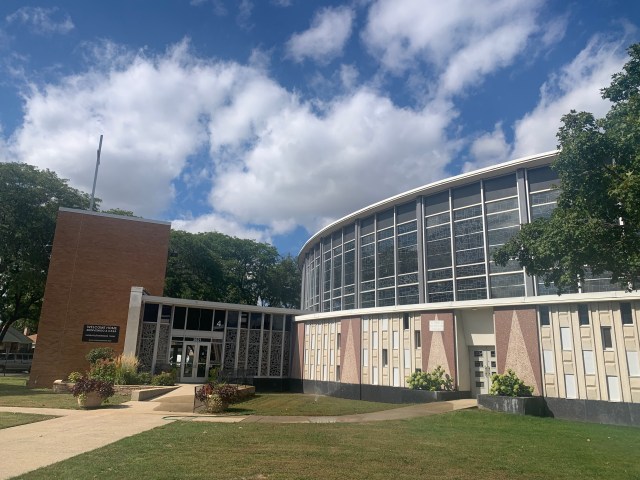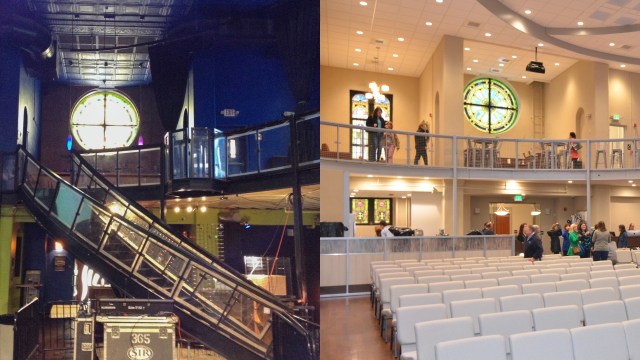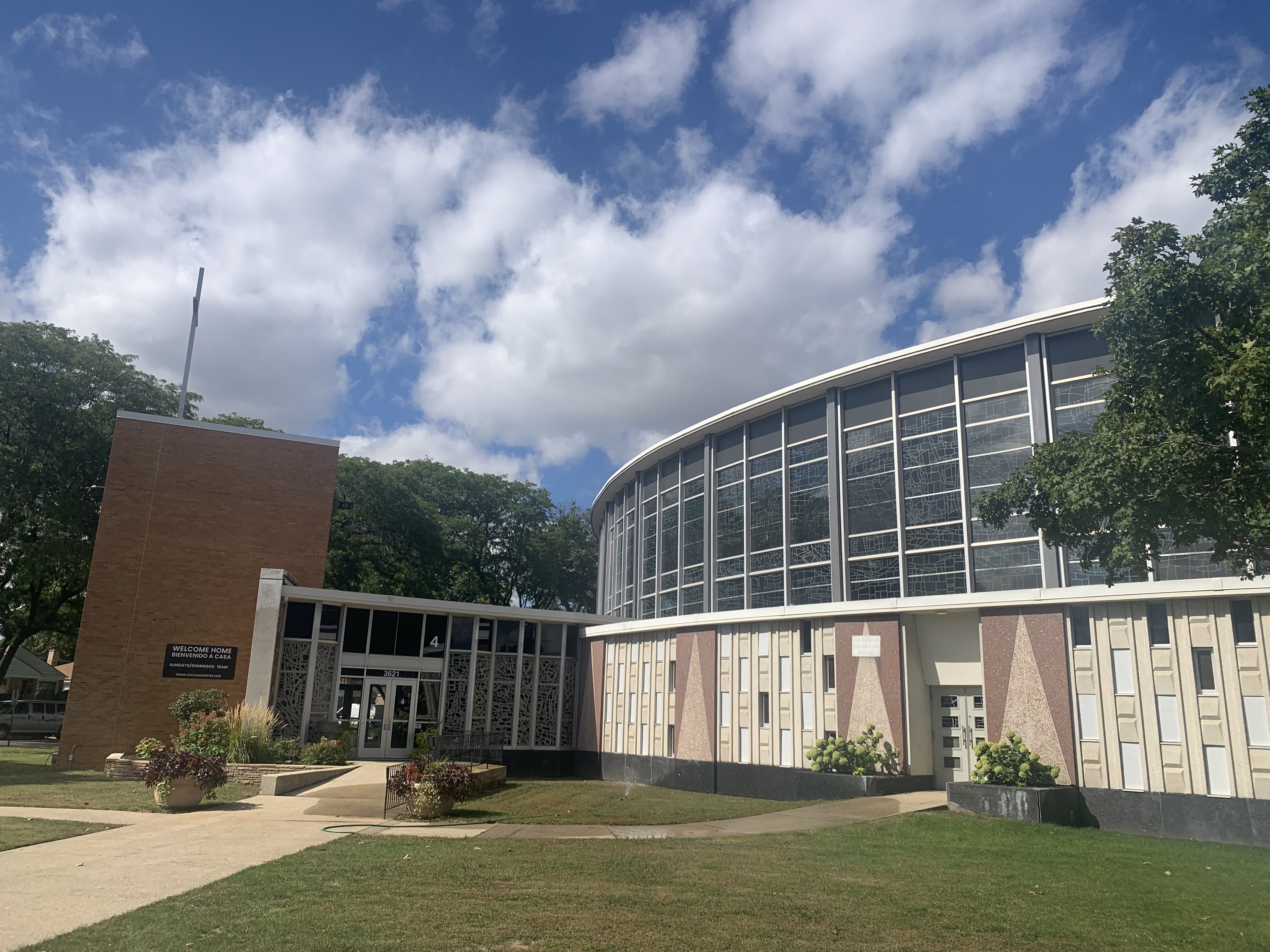More than 70 years ago, when St. Jude Catholic Parish was established in Joliet, Illinois, the community boasted a robust manufacturing sector with Caterpillar, Texaco, and US Steel among the big companies with plants in or near the gritty far-southwest suburb of Chicago.
But just as that area’s industry has since faded, Joliet’s Catholic congregations have also declined. Last year, the local bishop merged St. Jude into several other parishes, closed the sanctuary, and sold the property.
Buying the church structure and adjacent buildings, nearly eight acres in total: a growing evangelical congregation affiliated with the Assemblies of God. Victory City Church, based in another part of Joliet, purchased the old St. Jude complex for $1.75 million.
“That facility will help us continue in our growth,” said Rusty Railey, who copastors Victory City with his wife, Victoria. The Catholic property proved a more cost-effective option than planned expansion at its current location. “I just look at it as the kindness of the Lord to give it to us and keep it as a church.”
As the Roman Catholic Church shutters parishes in places contending with fewer people in the pews and priests in the pulpits—along with the financial toll of the abuse crisis—it’s often other religious groups who buy and lease the sites.
Local Catholic leaders tend to be grateful that others can use the space for worship and service. But it’s not always a smooth transition. Evangelical churches without experience with bigger facilities may not be ready for the upkeep. And local Catholic parishioners may feel the emotional sting of seeing their former sacred spaces dismantled and reused by other traditions.
At the new Victory City campus, there’s not only the sanctuary but also former school buildings, a gym, a rectory, and a chapel that the former Catholic congregation used for Eucharistic adoration. The church plans to hold worship at the new site early next year and later open an elementary school and possibly a 24-hour prayer space in the chapel.
These changes “just fit more into our mission approach to the city,” Railey said.
Closures and mergers of Catholic sites have ramped up in areas including the Midwest and Northeast, often as part of organized downsizing initiatives by church leadership, sometimes in tandem with bankruptcy filings. At last count, more than 40 Catholic dioceses and religious orders have sought bankruptcy protection, with 13 of those cases pending.
“As we all are aware, many things have changed in the last 50 to 60 years,” wrote Joliet area’s Catholic bishop, Ronald Hicks, to his flock during a “targeted restructuring” that wasn’t among the bankruptcies.
“We have significantly less vocations to the priesthood, our active priests are aging, and our beautiful churches that were built with labors of love and much financial sacrifice are in need of significant repairs, largely due to prolonged deferred maintenance.”
With church attendance dropping across the US, it’s not just Catholic churches that are closing and leaving behind buildings, which are sometimes turned into trendy condos or affordable housing. By some estimates, a record-high 15,000 churches could shut their doors this year.
Real estate broker Matt Messier, whose company Foundry Commercial has sold around 3,000 churches over the last 50 years, estimates that more than half of church properties—whether Catholic or mainline Protestant—get bought by a fellow faith group.
“There’s a lot of churches out there that are renting, so when a [church] building becomes available, they’re looking for that,” said Messier.
Even if evangelical Protestant congregations aren’t looking for high-church sanctuaries with steeples and stained glass, “There’s that functionality … the zoning’s in place. … There’ve been some very, very nice fits.”
An ongoing study on Chicago churches by the University of Notre Dame researchers found the same. “The most common reuse of dedicated church buildings—not only Catholic church buildings—is reuse for another church,” said program director Maddy Johnson.
In Bellwood, a western suburb of Chicago, some members of St. Simeon Catholic Church struggled with seeing their building closed within the last few years and then sold, said Rick Gonzalez. With his wife, Angela, Gonzalez helms the International Christian Fellowship church that bought the St. Simeon site within the past few years for about $1.35 million.
“We did our best with the congregants who were having a hard time,” Gonzalez said. His Pentecostal, nondenominational congregation has a half-dozen sites across Chicagoland. “We welcomed them into the building and reassured them it’ll remain a church.”

Named for the French crusader and monarch of the 13th century, St. Louis the King Catholic Parish was founded in the 1920s in Detroit. Nearly a century later, with the Polish community it’d long served fading away, the parish closed and the church was sold in 2016.
New Greater Zion Hill Missionary Baptist Church, led by pastor Eddie J. Patterson, bought the property. The growing congregation had been renting a smaller place and wanted its own space for its 350 members.
The parish property included a church building, rectory, gym, fellowship room, and commercial kitchen. The school once affiliated with St. Louis the King had already been torn down.
Patterson said what attracted his congregation to the property was “just the beauty of it.” And “they gave a really good deal. … I think it was about $400,000.”
New Greater Zion Hill moved in in 2016. A statue of St. Louis remains on the exterior of the sanctuary, but the Baptist church replaced the crucifix on the interior back wall with a lighted cross.
There have been a few maintenance issues with the property, but nothing major. The church renovated bathrooms to widen stalls and add urinals. With three boilers to supply the buildings, Patterson had to find reliable contractors who could service the campus-wide system. They’re considering a split system that could be more cost-effective for Michigan winters.
“To be honest with you, I was really impressed with how the church was kept,” Patterson said. “This building was built in 1959.”
Another striking church building—featuring Roman columns and a towering steeple—sits along a roadway named for the architect Frank Lloyd Wright in Lakeland, Florida.
For years, the church belonged to a Catholic elementary school called St. Joseph Academy, which closed during the pandemic and was sold to nearby Florida Southern College. Though Florida Southern is affiliated with the United Methodist Church, it now leases the church to an evangelical congregation called City Central Church, founded by former megachurch pastor Jay Dennis.
Dennis retired in 2017 from the First Baptist Church at the Mall in Florida, but after a few years, he said he felt God calling him back into ministry. The Lakeland property became available, and Dennis launched a new congregation there starting in 2021, said associate pastor Lonnie Lawson.
“That building became available in the right timing, in the right ways, and it just worked,” Lawson said. “I would say ‘hand of God’ for sure.”
The congregation started with around 120 to 130 people, and “four years into it, we might be 300, 350 now, so we’re a growing church,” he said, adding that before the church was Catholic, it’d begun as a Baptist worship site in the 1960s.
In Pittsburgh, St. Elizabeth Catholic Church began in 1895 as the first Slovak parish in the city. The church building, still standing in an area known as the Strip District, was built in 1908. It closed in the 1990s amid a merger and was eventually sold, according to an online history.
The initial buyer turned it into a nightclub branded with religious imagery called Sanctuary. It was later renamed Altar Bar, which offered live shows.
Once that venue shut down in 2016, multisite Orchard Hill Church bought the building and reverted it back into a Christian worship venue that, after renovations, opened in 2019.
“We’d been looking kind of all over downtown,” said Kurt Bjorklund, senior pastor of the growing evangelical congregation. “One guy in our church called me and said, ‘I know this guy and he’s probably interested in selling,’ and we made a deal without it ever going to market.”
The Altar Bar owner, a Catholic who died earlier this year, “liked the idea of it going back to a church,” Bjorklund said. The neighborhood could be described these days as hipster, and Orchard Hill sees its Strip District campus as one with “primarily a young crowd in age and in heart.”
Not every former Catholic property sale has worked out. Some that were sold proved too costly for the groups or congregations that bought them, and buildings turned into white elephants. Roofs, furnaces, and other upkeep expenses can price congregations out of buildings.
A century-old Gothic church on Chicago’s South Side is one example. Built for a mostly German Catholic parish and initially called St. Martin de Tours, it sold to an evangelical congregation in the 1990s but has been closed since 2017. It now sits rotting, with visible holes in the windows and roof and nuisance calls to the police.
Sometimes, Christian groups buying Catholic sites “are not very large” and not “capable of caring for the properties, then they take them and they fall to pieces,” said Brody Hale, a Massachusetts attorney who has helped Catholic parishioners navigate church bureaucracy to appeal parish closings by local bishops.
And not everyone is happy when Catholic buildings are closed or sold, even if they end up retaining their purpose as a worship site. Parishioners with strong emotional, historical, and spiritual ties to a church mourn the closures and can be disappointed to see their sacred space used by what some consider a rival or even heretical group.
“Catholic bishops are required to protect former Catholic worship sites from what canon law calls ‘sordid use,’” said Notre Dame’s Johnson. “In addition, recent Vatican guidance has encouraged, where possible, proactively finding mission-aligned reuses. What this means for non-Catholic religious reuse of former Catholic sites is a point of debate.”
In the Buffalo, New York, area, a grassroots group called Save Our Buffalo Churches has fought efforts to close Catholic churches. As Catholic leaders continue to shed properties amid bankruptcy proceedings fueled by sex abuse claims, advocates argue that “once a church building is consecrated, the intent is for it to go ‘in perpetuity’ and not be deconsecrated ‘willy-nilly.’”
Mary Pruski, a local parishioner with Save Our Buffalo Churches, knows of no Catholic buildings sold to evangelical congregations. “We certainly wouldn’t mind,” she said. “And some of the disenfranchised Catholics might show up there too.”
Greg Tucker, a spokesman for the Buffalo diocese, said its reorganization has resulted in “many significant changes, most notably the merger, consolidation, and closure of certain parishes” and their sale to other faith groups, including Christians and Muslims. Last year, a press release from the diocese indicated it would have 78 fewer worship sites after mergers and closures.
One major sale involved Christ the King Seminary, a former priest-training ground, which went to the World Mission Society Church of God, a Korean religious organization considered an unorthodox sect by Protestant Christians.
In Canada, a former parish, Mary Queen of the World, became a new location for Calvary Baptist Church.
The Catholic Archdiocese of St. John’s has also been selling properties to satisfy settlements over widespread sexual abuse at a former orphanage called Mount Cashel, among other settings, said Canadian attorney Geoff Budden, whose law firm represents more than 200 of the 350 claimants.
The available parish “presented an opportunity” for the Baptists and for ecumenism, as the pastor of the new site allowed a food pantry run by a Catholic social service agency to remain.
In parts of the South and Southwest, where evangelicals have long had a strong presence, a different problem has emerged: accommodating the growth of Catholic communities, sometimes ethnic churches serving congregants of Asian and African descent, beyond the surge in Latino Catholic immigrants.
Outside Dallas, a Catholic parish serving Vietnamese worshipers recently built a new sanctuary on property bought some years ago from a Church of Christ congregation, according to Danny Muzyka, president and founder of Texas-based Church Realty.
“We’re hunting now for a Ugandan Catholic church in the Fort Worth diocese looking to buy a building,” Muzyka said, adding that the growth of such ethnic congregations is “primarily a function of immigration.”
In Atlanta, Catholic leaders have “opened many very large parishes in the suburbs, and some of these parishes have struggled to have parking lots large enough to fit the number of Catholics wishing to attend their weekend liturgies,” according to a report published in Theology Today in 2021.
The researchers, who include a Jesuit priest affiliated with Georgetown University, concluded: “As parts of the South struggle to provide enough infrastructure to accommodate the influx of parishioners, parts of the Northeast and Midwest find themselves with a surplus of buildings in areas that no longer have enough parishioners to keep them open.”
In Muzyka’s experience, of the church properties being sold, whether Catholic or Protestant, “maybe 30 percent of them are a change of use, meaning the church completely goes away.”
Robert Herguth is a writer based in Chicago and an investigative reporter at the Chicago Sun-Times.















